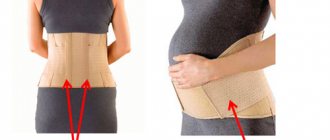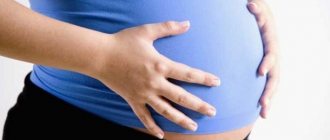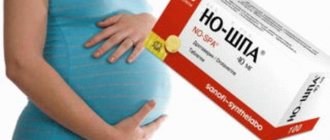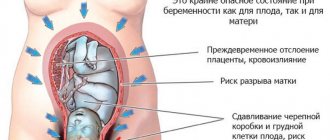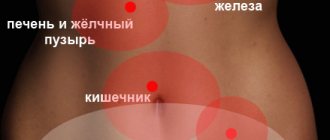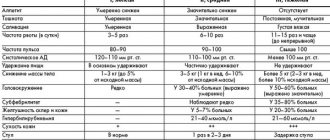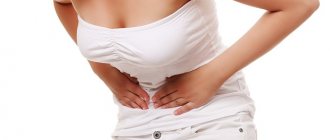Other causes, non-obstetric
First of all, a pregnant woman may experience abdominal cramps caused by the most common intestinal problems. In addition, due to the pressure of the uterus, pregnant women often suffer from constipation, which can also be accompanied by gas formation and severe pain. The uterus puts pressure on the internal organs, displacing them as it grows. Therefore, a woman may experience pain in the abdomen. Also, among non-obstetric causes of acute pain there may be diseases: appendicitis, cystitis, pancreatitis. Food poisoning is possible.
Sharp pain in the lower abdomen during pregnancy and its causes
Almost every woman carrying a child feels discomfort or mild pain in the abdomen, to one degree or another. These sensations may later manifest as high-intensity pain in the abdominal area. The vast majority of doctors attribute these symptoms to changes in the hormonal levels of the expectant mother's body. The manifestation of pain at the early stage of bearing a child is due to the growth of uterine tissue, which causes discomfort and pain in the lower peritoneum. Pain syndrome can also manifest itself against the background of exacerbation of existing chronic ailments.
Cramps at the beginning of pregnancy, which should alert you
At the very beginning of pregnancy, when the fertilized egg attaches to the uterus, a woman may feel pain, but not everyone even pays attention to it. If in the first trimester a woman experiences acute pain in the lower abdomen on one side, there is a high probability of an ectopic pregnancy. In this case, you need to consult a doctor as quickly as possible, since this phenomenon poses a threat to the woman herself, and, unfortunately, bearing a child is impossible. In addition, if the expectant mother suffers from sharp, severe cramping pain in the lower abdomen, while she experiences bleeding or unnatural discharge, this may be due to the threat of miscarriage. Intense pain and discharge may also indicate a missed pregnancy. In these cases, you also need to consult a doctor.
Why does the stomach hurt during pregnancy?
Cramps during pregnancy in the lower abdomen can be directly related to the process of bearing a child or implicitly related to it. Therefore, in medicine there are obstetric and non-obstetric factors that explain pain in the lower womb. Non-obstetric causes of pain include:
- cystitis;
- disruptions in the gastrointestinal tract;
- appendicitis;
- inflammation of the ovaries;
- dysfunction of the kidneys and adrenal glands.
Obstetric causes of a “painful abdomen” during pregnancy:
- placental abruption;
- ectopic pregnancy;
- fetal freezing;
- hypertonicity of the uterus;
- the beginning of the baby's birth.
Impaired urination, inflammation of the bladder, the presence of pus and leukocytes in urine, accompanied by cutting pain in the lower abdomen, is called cystitis.
Often in pregnant women, cystitis occurs due to hormonal changes and weakened immunity, due to which infections actively multiply and enter the bladder. The main symptoms of cystitis include acute pain in the lower part of the womb, frequent painful emptying of the bladder, elevated body temperature, and the presence of blood in the urine. With pregnancy, a woman’s body undergoes a global restructuring, therefore many organs and systems change their usual functioning. Often, malfunctions occur in the gastrointestinal tract, which leads to gas formation, colic, heartburn, and frequent constipation - this is why the stomach hurts during pregnancy. Gastrointestinal problems can be eliminated with proper nutrition, sometimes with medications. The pain can have different intensity (pulsating, gradual, increasing) and worsen in any part of the abdomen: left, right, sometimes causing pain in the anus.
Acute cutting pain on the right side is characteristic of inflammation of the appendix of the cecum - appendicitis. Therefore, girls who have this process should visit a surgeon to establish an accurate diagnosis and further solve the problem. Right-sided pain in the lower abdomen may be a sign of a disease of the appendages and genital organs. To eliminate pain, you need to consult your gynecologist.
How to act, how to help
If cutting pains during pregnancy are not accompanied by additional alarming symptoms, appear periodically, and do not last long, there is no need to panic, just take a comfortable position in which you can relax. Most likely, these pains are associated with pressure from the growing uterus on organs, displacement of organs, stretching of the abdominal muscles, or movements of the baby. If the pain does not subside or is accompanied by bleeding, vomiting, diarrhea and other painful conditions, call a doctor immediately. If you have problems with the gastrointestinal tract, it is also better to consult a doctor, because pregnant women cannot take most of the usual medications, so even ordinary medications for stomach upset should be prescribed by a doctor.
No need to worry
Starting from approximately 32-34 weeks of pregnancy, the baby’s body is almost completely prepared for birth. At this time, the baby begins to move towards the entrance to the small pelvis, due to which the tone of the anterior abdominal muscles is somewhat weakened, and the stomach begins to descend. According to an old folk belief, this indicates that labor will begin in about 1-2 weeks.
In reality, things are somewhat different. The baby presses its head against the cervix not because it wants to be released into the world quickly, but simply because of its large size. Of course, this does not mean that in the very near future you will have to urgently go to the maternity hospital; nature came up with this mechanism to facilitate the process of childbirth.
When the baby rests against the cervix, this is often accompanied by nagging and aching pain in the lower abdomen.
This usually happens in the later stages, but some women report discomfort even from 3-4 months. If pain in the lower abdomen is not accompanied by other unusual symptoms, then there is no need to worry - just visit your obstetrician-gynecologist and choose the optimal antispasmodic.
Severe abdominal pain in early pregnancy and its pathological causes
Abdominal pain in early pregnancy may indicate the presence of serious pathologies such as:
1 Threat of miscarriage. During the threat of miscarriage, the feeling of pain does not stop, but increases with renewed vigor. In addition to pain, bleeding may occur. If these symptoms are detected, a pregnant girl urgently needs to visit an antenatal clinic. There is no need to worry prematurely, because if you consult a doctor in a timely manner and determine the threat of termination of pregnancy, in most cases the baby can be saved.
2 Corpus luteum cyst. During pregnancy, women temporarily develop a corpus luteum instead of a follicle. It is necessary for the production of progesterone. Sometimes, due to the accumulation of fluid, the corpus luteum grows and a corpus luteum cyst appears. This pathology is not as scary as it seems at first glance. She poses virtually no threat to the baby. Among the recommendations when identifying this particular disease, it is worth noting that there is no need to put a lot of stress on the body, lift weights, or strain. Large loads contribute to the rupture of the cyst and, as a result, the appearance of internal bleeding.
3 Ectopic pregnancy. The presence of this type of pathology is indicated by constant pain in the lower abdomen. They can be localized both on the right and on the left. Pain is felt when the embryo attaches to the fallopian tube. As the embryo develops, the fallopian tube may burst. Symptoms of a uterine tube rupture: profuse bleeding, persistent very severe pain, gag reflex, dizziness. Diagnosing an ectopic pregnancy in the early stages of pregnancy is considered the most ideal, because if the fallopian tube ruptures, serious consequences are possible for a girl.
4 Frozen pregnancy. There are many reasons that can contribute to the arrest of the baby’s development and vital functions. Not all of these reasons have been studied reliably. During a frozen pregnancy, a woman feels acute pain, sometimes accompanied by bleeding. In most cases, the result of a frozen pregnancy is a miscarriage.
Ectopic pregnancy
This pathology makes itself felt from the very first days. In this case, the fertilized egg is fixed not in the uterine cavity, but in another place. Tubal pregnancy occurs most often. As the embryo grows, the walls of the organ stretch. This causes unbearable pain to the woman.
In addition, spotting from the vagina, weakness and fever may occur. Treatment should be carried out immediately. Otherwise, the organ will rupture and internal bleeding will begin, which can be fatal.
Pathologies that are not associated with pregnancy
Cutting pain in the abdomen can be caused by various processes that are absolutely not related to pregnancy. These include the following:
- rupture of an ovarian cyst or torsion of its legs;
- formation of intestinal obstruction;
- microflora disturbance and dysbacteriosis;
- adhesions due to previous operations or inflammation;
- progression of a sexually transmitted disease;
- poisoning or eating stale food;
- abuse of gas-forming products;
- liver and spleen diseases (lack of enzymes);
- urinary tract diseases (bacteriuria, pyelonephritis).
Most of them do not pose any threat to the baby’s life if treated in a timely manner.
Threat of interruption of embryo development
This condition is possible from severe moral exhaustion, heavy strength loads, or deviations in the development of the fetus throughout pregnancy:
- up to 22 weeks it is a spontaneous abortion;
- from 22 to 37 weeks - premature birth.
It's no secret that most miscarriages and embryo failures occur in the early stages. This is due to the fact that so-called natural selection occurs during this time period. If the fetus has any abnormalities in genetics or receives the wrong set of chromosomes, then it simply stops its development.
This condition may be accompanied by unpleasant painful sensations that jeopardize pregnancy. The back during this period can also remind itself. During contraction of the reproductive organ, a woman feels heaviness in the lower back.
Prevention of aching pain
The main thing is not to worry about every tingling sensation, but rather:
- Register with the antenatal clinic on time and undergo all necessary examinations.
- Follow all doctor's recommendations.
- Get rid of bad habits.
- Avoid strenuous physical activity.
- Walk more in the fresh air.
- Eat properly.
To avoid discomfort, the expectant mother needs to follow some recommendations.
- You don't have to eat everything. Nutrition should be balanced and rich in vitamins.
- Contact a doctor in a timely manner, undergo all examinations and ultrasound diagnostics.
- Walk outdoors more often and do simple physical exercises.
- Treat all diseases in a timely manner.
- Avoid sex with unknown partners.
- When gas levels increase, it is enough to give up gas-forming products, take charcoal and drink plenty of liquids.
The nature of the pain and its danger can only be determined by a doctor based on the accompanying symptoms. In some cases they are harmless. Others require treatment and surgery. Therefore, do not neglect visits to the doctor.
Don't forget to rest, follow a daily routine
